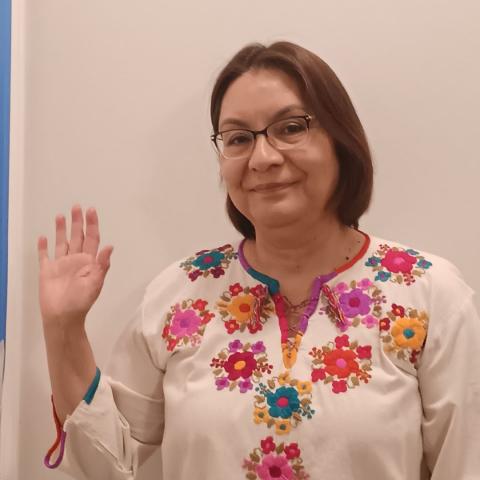
Ph. D., Latin American Literature, July 2006, University of California, Irvine
M.A., Spanish-American Literature, December 1998, University of California, Irvine
B.A., Spanish Linguistics, Magna Cum Laude. June 1996, University of California,
Riverside
A.A., Humanities, Arts and Sciences, Cum Laude June 1992, Barstow Community College
Her research centers on different areas of scholarly interest such as: Mexican Literature and Culture; Latin American Literature; Chicano and Latinx Literature; Film, and Gender Studies with focus on migrations, Latine feminism, and Afro-Mexican history and culture. She is currently overseeing the Latinx Studies Minor and contributing to Cambio Center as a Board Member. She is a Fellow of the Intercultural Migration Studies Institute (IMSI) and the Afro Romance Institute. She is serving as the Vice President of Rocky Mountain Modern Language Association (RMMLA).
Dr. Pérez-Anzaldo has written two monographs: Memorias pluridimensionales en la narrativa mexicana. Las mujeres judíomexicanas cuentan sus historias. (2009), and El espectáculo de la violencia del siglo XXI (2014). Her first book revolves around memory, diaspora, and history in the narrative fictions of four Jewish-Mexican women writers. In this study, she illustrates how these authors open a space for polyvalence and plurality in the Mexican narrative while at the same time interpret and transform what it means to be a Jewish woman in a predominantly Catholic and patriarchal society. Therefore, these writers portray hybrid, ambiguous, and displaced subjectivities from their life in the margins of society that offer a serious challenge to the accepted paradigm of homogeneous cultural values and essentialist national identities. Their counter-narratives offer different linguistic, religious, and ethnic cultures whose characters are always negotiating between their inherited traditions, languages and communal Jewish identities and the hegemonic mestizo cultural model prevalent in Mexico.
Her second book, El espectáculo focuses on the State-sponsored and gender violence as it is fictionalized in contemporary Mexican films. This emphasis on violence has an interdisciplinary approach based on a plethora of critical theories developed in Peace Studies, Sociology, Psychology, Anthropology, and Philosophy. Through a diverse array of approaches, these Mexican film directors explore the complexity of this multidimensional social phenomenon. Furthermore, they disclose the possibility that structural violence can be prevented, reversed, and even stopped when people are educated and informed about the unjust Mexican State modus operandi. Consequently, for these Mexican directors, it appears feasible to establish a true democratic political system in their country of origin by encouraging people to be well informed about this endemic violence that affects their everyday life. Cinema, seen through this lens, can serve as an instrument for social and political consciousness.
Furthermore, Dr. Perez-Anzaldo has co-edited an anthology titled Memorias globalizadas: Antología crítica en torno a la literature latinoamericana (2020). Her articles have appeared in refereed journals such as: Revista Iberoamericana, Confluencia, Revista de Literatura Mexicana Contemporánea, Ciberletras, among others. Her course offerings include Twentieth-Century Mexican Literature, Latin American Women Writers, Latinx Literature, Chicano Literature, Latin American Film and Culture.